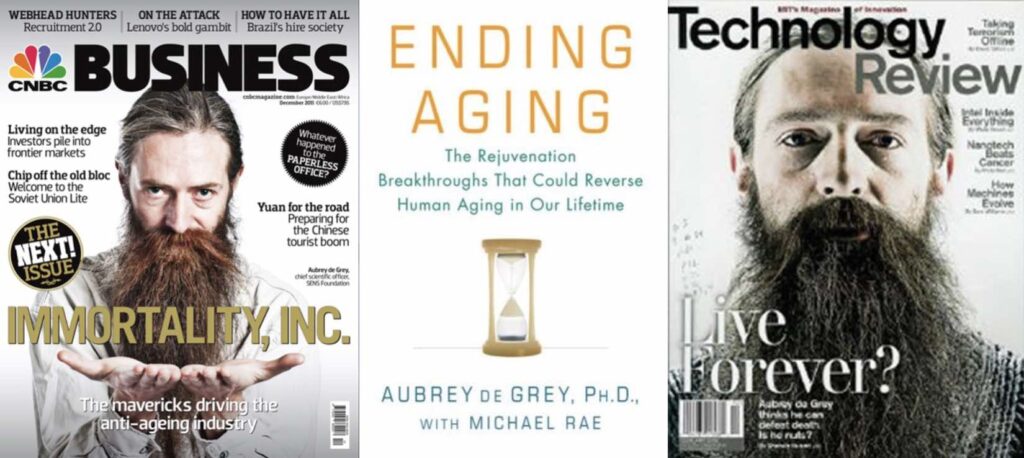“The impulsion to leap to embarrassingly unjustified conclusions in order to put the horror of aging out of one’s mind.” That’s what Aubrey de Grey has to say about why humans become obsessed with relatively meaningless tasks throughout our lives – really, we’re just trying to take our minds off of ‘the end.’
We hosted a dinner in London a couple of weeks ago where Aubrey and several very influential people joined us to discuss this topic, which is both simple and unbelievably complex to think about.

If you really think about, it’s terrifying. Whether a person chases money to become a billionaire or if someone donates their life to help the sick… what’s the end result? I guess it’s all about the journey… right?
Clearly, that’s a question that means something different to each individual. And, really, there will probably never be a correct answer. Life is purely subjective… or something like that…
However, one thing that we can probably all agree on is that life is short. And it feels shorter the older you get. The more we experience and learn, the more we want to achieve and solve, and the less time we have to accomplish our list of expanding goals.
Although I can’t say for certain, I doubt there is anyone who has left this earth who can honestly say, “I did every single thing I ever wanted to accomplish.” Humans always want more.
Sure, we all have bucket lists, but we make those lists based on the parameters of our forecasted timeline and capabilities. What if we could expand that list based on our imaginations and creativity?
That’s why the world needs the Thomas Edisons and Elon Musks. We need people to push the limits so hard that they look absolutely nuts. That is, until they actually achieve what they’re pursuing.
One of those people is Aubrey de Grey. There are plenty of naysayers out there that criticize what he stands for because, really, what he talks about shakes some people to their core with fear.

When you start to mess with the natural lifespan of a human being, a lot of ethical and moral concerns enter some people’s minds. For others, it’s a natural problem to be solved and a step in the right direction for the advancement of humans.
But, the stuff that Aubrey (and many other highly respected scientists and medical authorities) are talking about is real. This isn’t fantasy-make-believe-science-fiction that’s going on. There are real steps being made towards enabling humans to live much longer lives that could possibly evolve into becoming ‘immortal.’
Of course there are numerous exterior factors, like the health of our planet, solar system, and so on that come into play. However, from a theoretical approach, the actual process of slowing down aging and then eventually reversing the process is something that is within reach.
For example, at the University of Alabama at Birmingham, “researchers have reversed wrinkled skin and hair loss, hallmarks of aging, in a mouse model. When a mutation leading to mitochondrial dysfunction is induced, the mouse develops wrinkled skin and extensive, visible hair loss in a matter of weeks. When the mitochondrial function is restored by turning off the gene responsible for mitochondrial dysfunction, the mouse returns to smooth skin and thick fur, indistinguishable from a healthy mouse of the same age.” – Science Daily

Obviously this example with a mouse does not directly translate to a human, but the concept of reversing the aging process is in fact possible.
Now, it’s a matter of figuring out how to reverse the larger scale problems that go beyond hair loss and wrinkles – and make sure it works for humans.
I won’t for a second attempt to explain the work that companies like Age X, Insilico, Unity, or Human Longevity are doing. Not because I won’t explain their technologies, but because I myself can’t even understand exactly what they’re doing!
However, just because I (or you) can’t understand the exact science does not mean we should dismiss the possibility that we can in fact extend our lifespans.
This scenario has happened many times in the past, where the general public does not understand a technology, resulting in the assumption that something is impossible. Here are some examples:
“The truth in no online database will replace your daily newspaper, no CD-ROM can take the place of a competent teacher and no computer network will change the way government works.” – Clifford Stoll
“The Americans have need of the telephone, but we do not. We have plenty of messenger boys.” – William Preece, British Post Office.
“The horse is here to stay but the automobile is only a novelty – a fad.” – President of the Michigan Savings Bank advising Henry Ford’s lawyer, Horace Rackham, not to invest in the Ford Motor Company.
“There is practically no chance communications space satellites will be used to provide better telephone, telegraph, television or radio service inside the United States.” – T.A.M. Craven, Federal Communications Commission (FCC) commissioner.
“A rocket will never be able to leave the Earth’s atmosphere.” – New York Times in 1936.
That last quote is of particular interest. Not only have we left the Earth’s atmosphere, but we’ve put a human on the moon and landed space craft on different planets within our solar system.
Can you imagine if we could travel back to the 1800’s and tell people that we have been into space? They would probably think we’re insane.
Perhaps we’re now those people who can’t see beyond our personal atmosphere.




